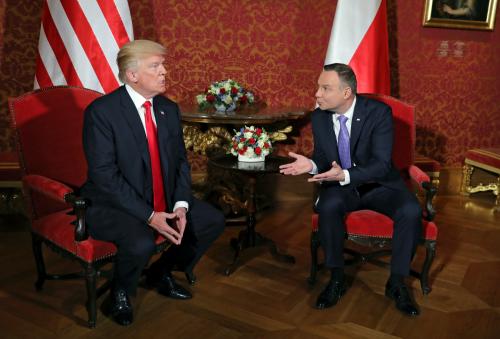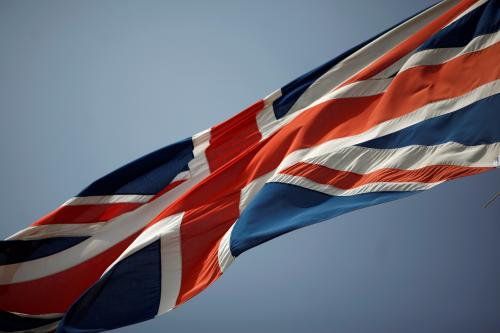Editor’s Note: In the aftermath of the Brexit referendum in the U.K., President Barack Obama and his immediate successor will face a tough dilemma when it comes to Europe. Philippe Le Corre writes that while close relations will remain with London on the business side, the U.S. administration will surely be split between its historical relationship with the U.K. and the current state of affairs when it comes to diplomacy. This piece was originally posted by CNBC.
In the aftermath of the Brexit referendum in the U.K., President Barack Obama and his immediate successor will face a tough dilemma when it comes to Europe. On one hand, the U.K. has been America’s closest ally for decades; they share countless cultural, social and linguistic links. London hosts hundreds of European headquarters for American companies. In financial services, London is tied in many ways to Wall Street. And the U.K. is still the U.S.’s second trading partner in Europe (after Germany).
But what happens now, with a semi-detached U.K. facing yet another Scottish referendum and a possible backlash in Ireland?
Across the channel stands a unified European market with 450 million consumers, a single currency for 19 countries (out of the 27 remaining EU members) and a fairly regulated trading block with which the U.S. is engaged and intends to engage even more through the Transatlantic Trade and Investment Partnership which is currently being negotiated. Now, the shots will be called from Berlin, Paris and Brussels. Ironically for such a proponent of free trade and free markets, London will no longer have a voice.
Between the U.S. and the “new U.K.”, everything will need to be reinvented.
First, on the business side, close relations will remain with London, the world’s most international financial center after Wall Street; it is also somewhat ironic that London, a great cosmopolitan capital, voted on June 23 (as the only constituency in England) to remain within the EU but will soon become the capital of a pro-exit, fairly isolated country.
As for investments, chances are that U.S. corporations will look closely at opportunities on both sides of the English Channel, as currency fluctuations and market size will often make a difference. For those large companies with an existing Eurozone presence, it may not be much of a problem as they will be able to split between their operations. As for new investment projects, it will be an entirely different matter as businesses will rightly wait to see the result of U.K.-EU negotiations in the next couple of years. Whether the U.K. will be in a Norway-style economic situation or a Serbia, a fairly isolated European country which does not even belong to European economic space, time will tell as London will try – amid a great deal of uncertainty- to impose of its future relations with the EU.
The redefinition of the international order under a different and more collaborative arrangement with new partners is not only a possibility, it is a reality.
Second, on the diplomatic side, the U.S. administration will surely be split between its historical relationship with the U.K. and the current state of affairs: both Germany and France are strong U.S. allies when it comes to economics, international affairs and security.
Germany is Europe’s strongest country with a highly respected leader, Chancellor Angela Merkel, and France is NATO’s top European contributor, a strong U.S. ally in the Middle East, sub-Saharan Africa and in counter-terrorism. In such an international security environment, having strong partners will matter a lot to Washington, and it may very well accept the Franco-German axis as its new top interlocutor across the Atlantic.
Politically, the U.K. is facing a tough few months with long, tedious EU negotiations and a new government by October after David Cameron’s announcement that he will step down as prime minister and leader of the Conservative Party.
As for his potential successor, former London Mayor Boris Johnson, it is an understatement to say he has not had a warm relationship with President Obama, having suggested in a newspaper article that Obama’s pro-remain attitude might be based on his “part-Kenyan” heritage and ancestral dislike of the British empire.
There will be attempts to reconnect the dots between Washington and London, but the acrimony is running high on the U.S. side, including in the diplomatic and military establishments. As U.K. defense spending had dropped below the two per cent required NATO target last year, both former Army Chief of Staff Gen. Raymond T. Odierno and U.S. Ambassador to the United Nations Samantha Power expressed their deep concerns about the 30,000 job cuts in the British military.
The U.K.-U.S. partnership under David Cameron has been a disappointment, leading to questions about the U.K.’s international role.
Hence my prediction that Germany and France, together or separately, will take over the “special relationship” and that the transatlantic alliance will be rebuilt on that basis, with Great Britain as a relatively junior member.
On a worldwide basis, it will play a similar role as Australia, New Zealand or Canada, also strong U.S. allies but with limited operational capacities. The redefinition of the international order under a different and more collaborative arrangement with new partners is not only a possibility, it is a reality.
The Brookings Institution is committed to quality, independence, and impact.
We are supported by a diverse array of funders. In line with our values and policies, each Brookings publication represents the sole views of its author(s).








Commentary
After Brexit, U.S. will need a new “BFF”
June 28, 2016